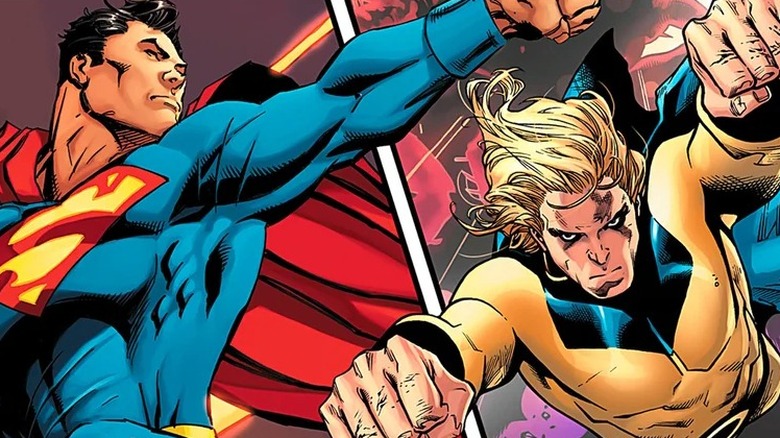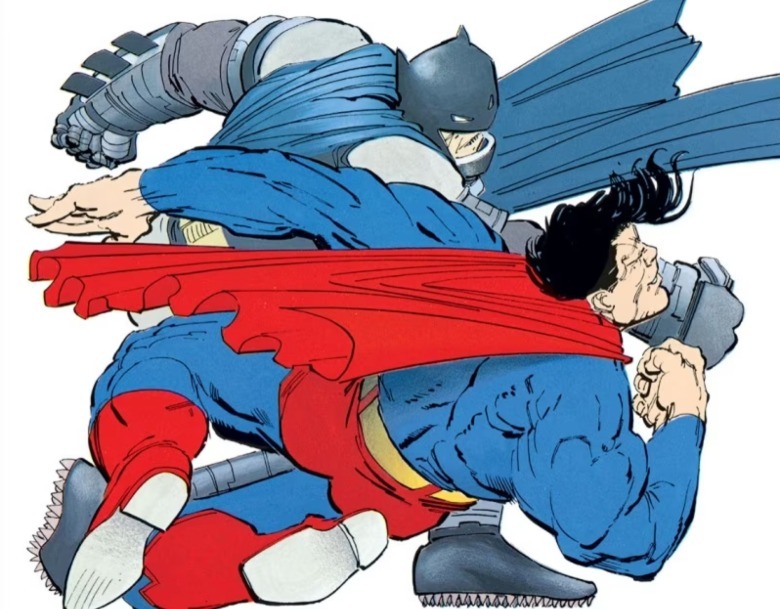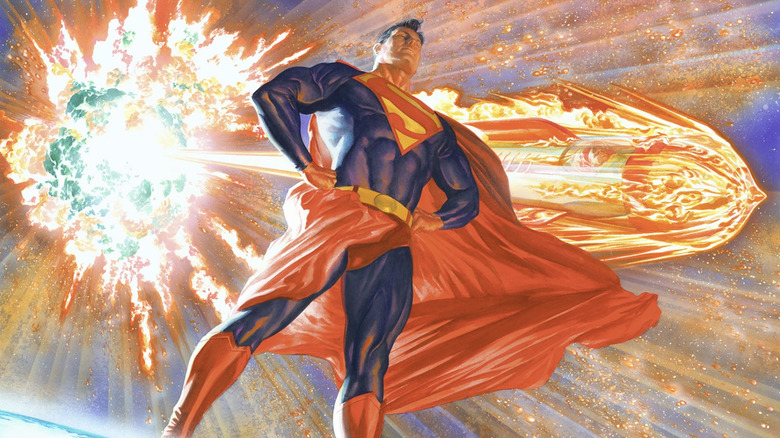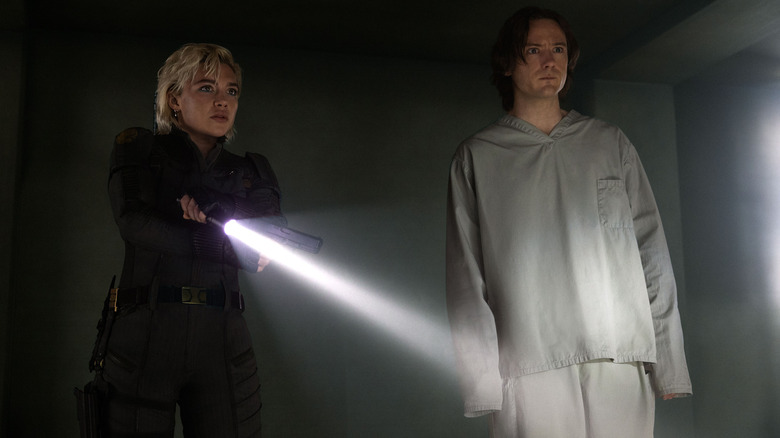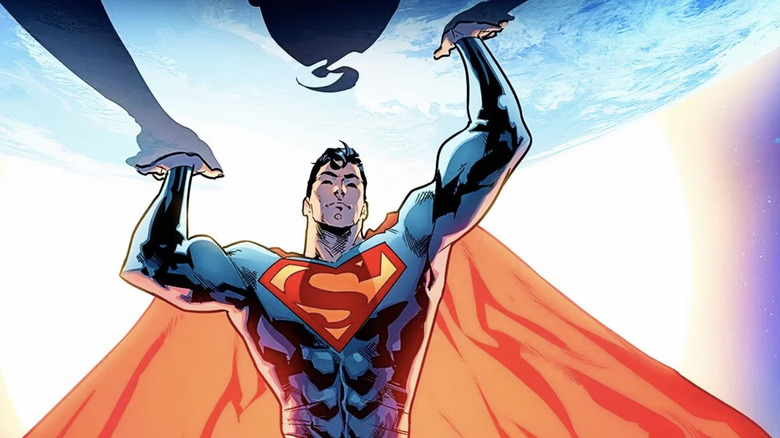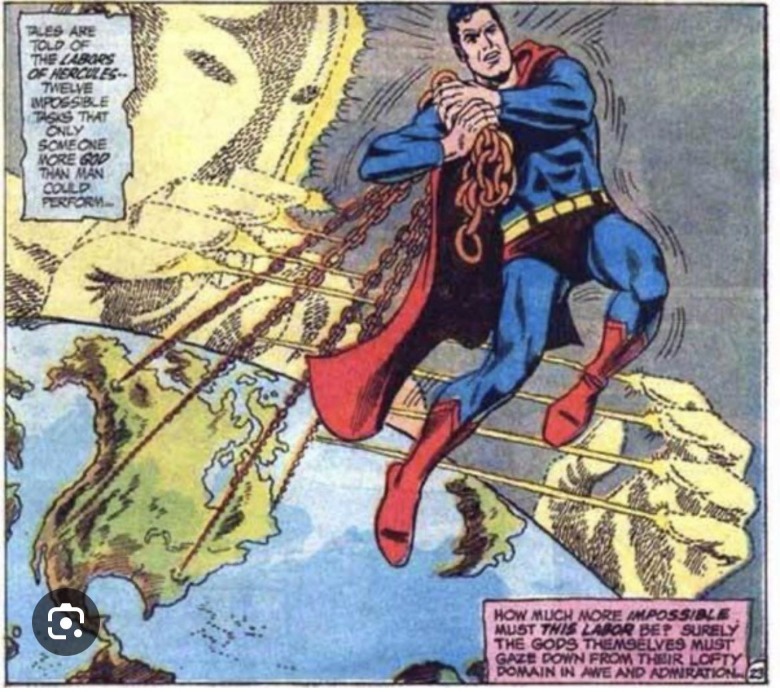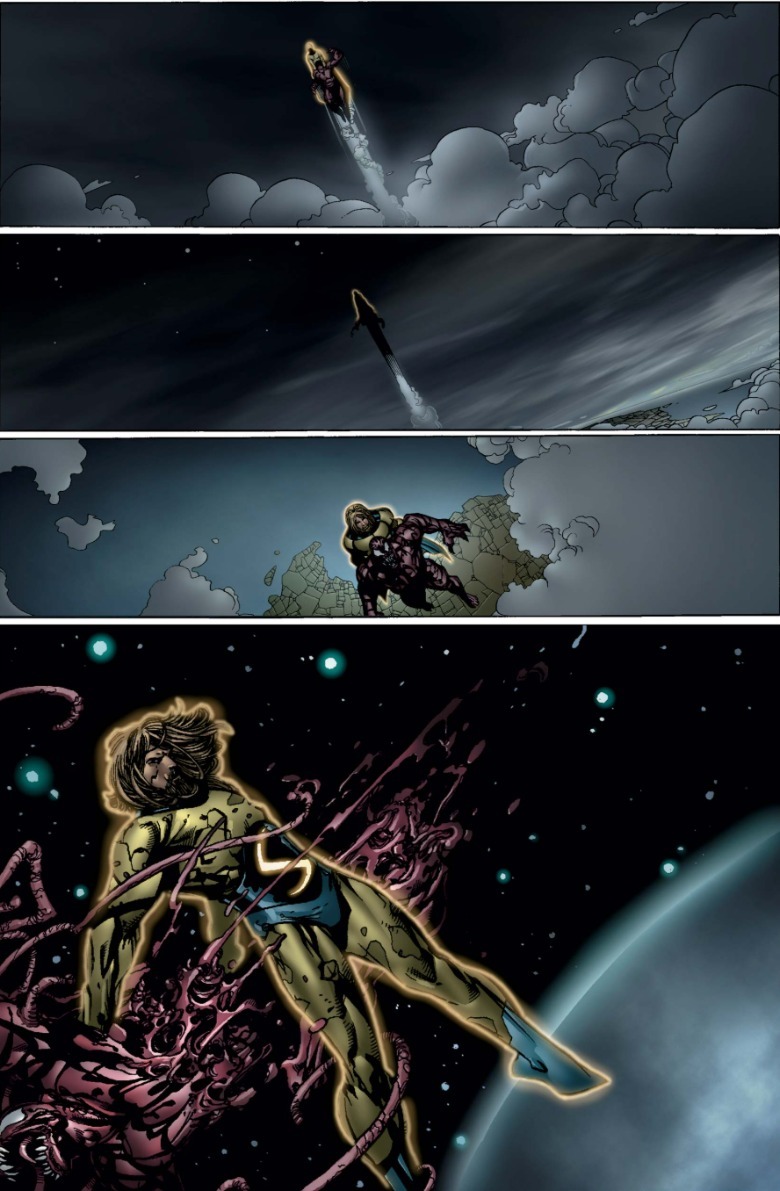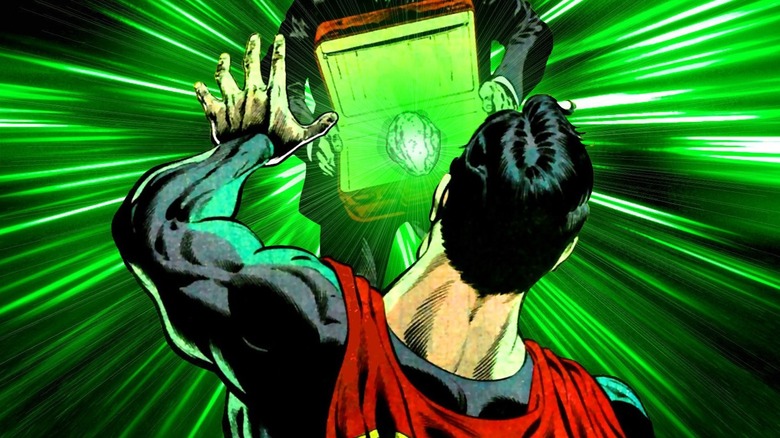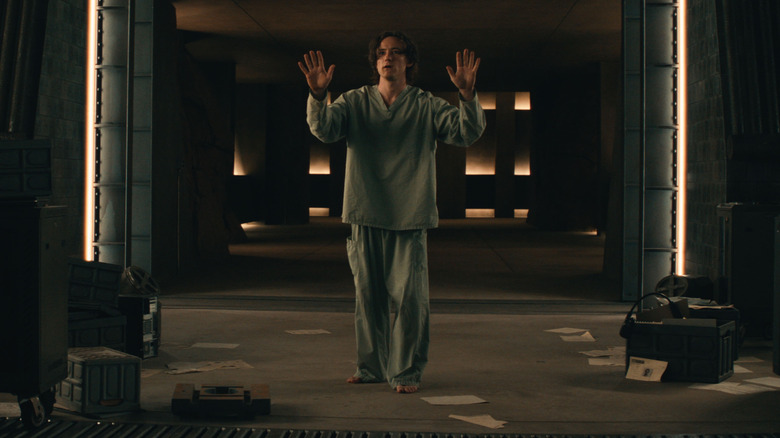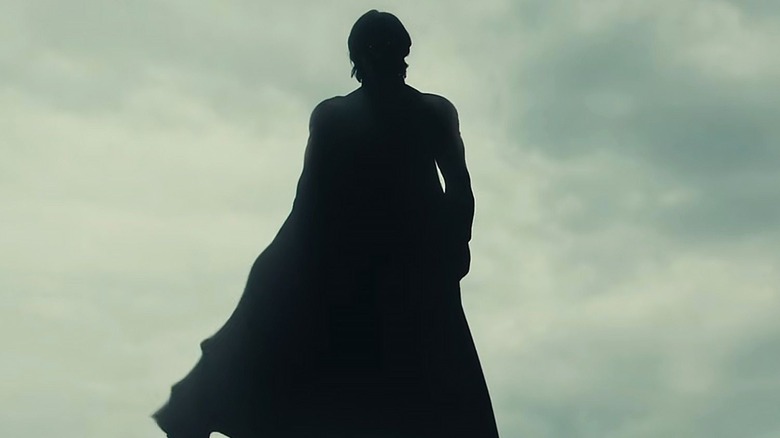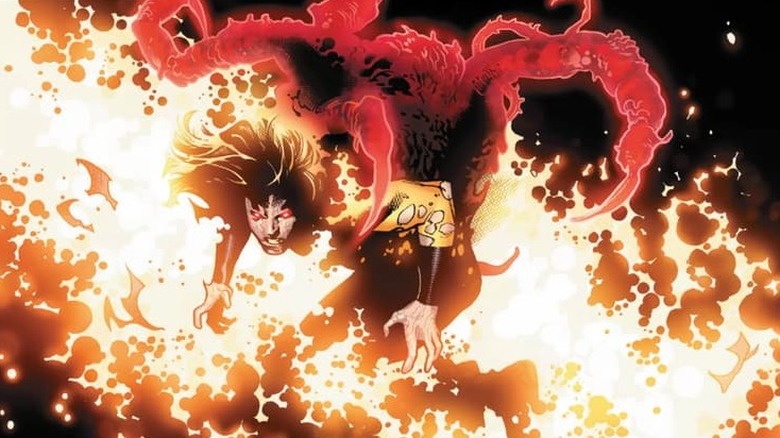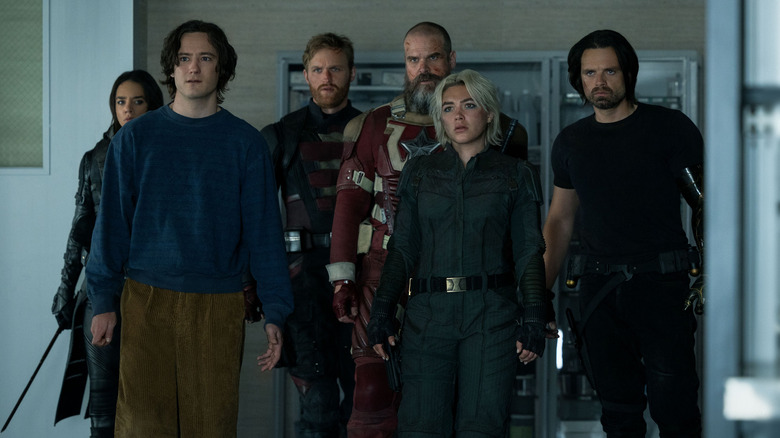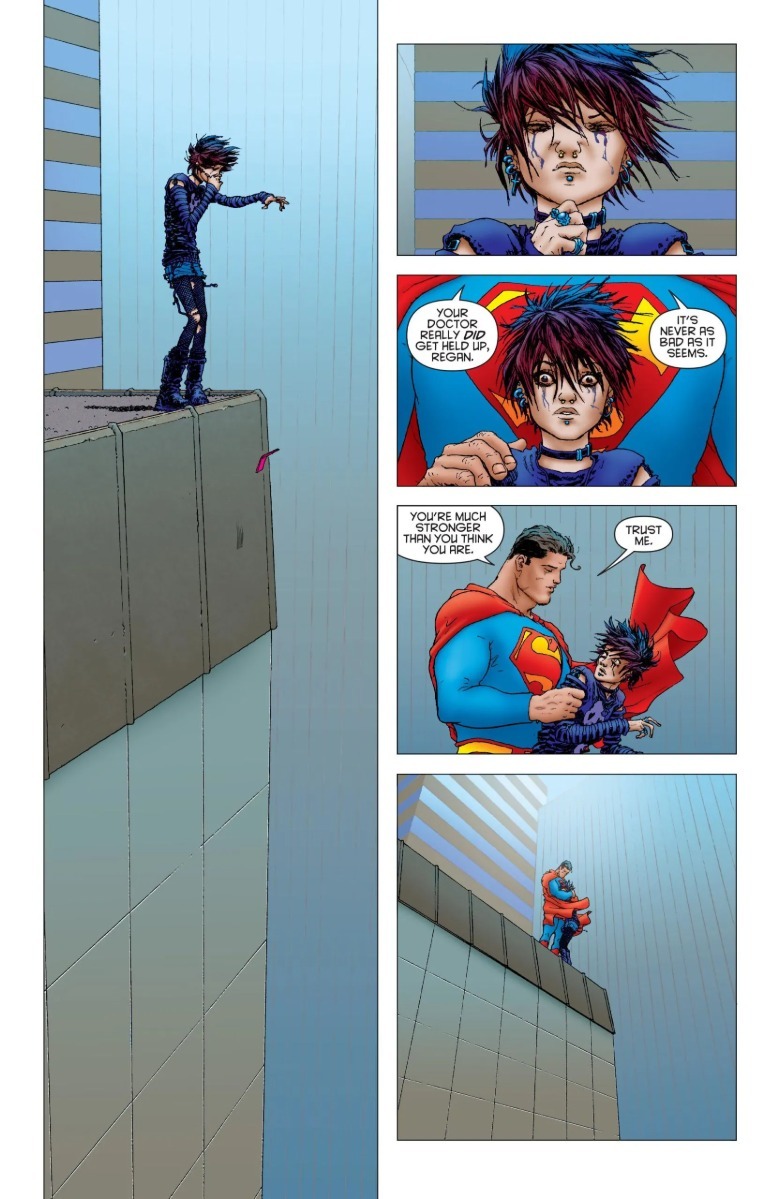Superman Vs Sentry: Who Is More Powerful?
Spoilers for "Thunderbolts*" follow.
"Superman" — directed by James Gunn, and starring David Corenswet as the big blue boy scout — is soaring into theaters this July. Hopefully, its impact will be big enough to push the new DC Universe on film forward.
But before Superman returns to the silver screen, Marvel has debuted its own Superman-analog for the big screen. "Thunderbolts*", which is one of the better and most emotional Marvel Studios movies in recent years, introduces Bob Reynolds (Lewis Pullman) aka The Sentry. CIA Director and Sentry's creator Valentina "Val" Allegra De Fontaine (Julia Louis-Dreyfus) brands him Earth's Mightiest Hero, because the Sentry is meant to be worth all six of the Avengers in one. The Sentry may indeed be as powerful as the Man of Steel, but if these two caped heroes ever fought, who would prevail?
Now, there's no actual answer. Spoiler alert: Superman and the Sentry aren't real. They can't fight without an opinionated writer shaping the outcome. That's why, sometimes, a guy wearing a batsuit can kick Superman's teeth in. In "The Dark Knight Returns" Frank Miller wanted Batman to defeat Superman, to show Bruce triumphing over the ultimate challenge and the Reaganite America which Clark represented. So, that's exactly what happened, even though Batman should "logically" have no chance against someone with Superman's abilities.
But that doesn't mean we can't examine the evidence to make our own conclusions. That's what a comic writer does to write a compelling fight between two super-powerful characters: look at the characters' traits, strengths, and weaknesses, and how they would interact with their opponents'.
Say you're writing a fight between Doctor Doom and Magneto. It's a logical conclusion that, since Doom's armor is metal, Magneto easily defeats him. But it'd be just as easy to counter that Doom — skilled sorcerer that he is — would've enchanted his armor to block Magneto's abilities from affecting it. That's not an easy out, it's a reasoned extrapolation of outcome from the characters as they exist.
What sort of extrapolations can we make out of pitting Superman against the Sentry?
The origin of Superman and the Sentry, compared
Not every detail about Superman as we know him was there from the beginning in 1938, when Jerry Siegel and Joe Shuster first created him. Yet 80+ years is a long time for a legend to be refined.
Superman is, to quote Jordan Peele, N.O.P.E. (Not Of Planet Earth). Born Kal-El on the doomed world Krypton, he was sent away as an infant in a rocket ship by his scientist father, Jor-El. Carrying the hopes and dreams of Krypton with him, Kal landed in Smallville, Kansas and found a new life as Clark Kent. This origin story has gone from mere pulp sci-fi to a pop-cultural epic, one that's earned Superman frequent comparisons to both Moses and Christ.
The Sentry is a more recent (and obviously derivative) character. Introduced in 2000, he was created by Rick Veitch, Paul Jenkins, and Jae Lee. The Sentry's Marvel Comics history is short compared to some of his peers, but it's very complicated. The first "Sentry" mini-series suggested that the Sentry had once been the world's greatest superhero, but erased all memory of his existence in order to contain his dark alternate persona, the Void. It's the perfect hook for a one-off story, but when the Sentry came back, writers expanded upon the character.
Brian Michael Bendis' "Dark Avengers" revealed Bob was a drug addict who stumbled into getting superpowers. "Thunderbolts*" mostly goes with that take, rather than complicating things by saying Sentry was actually around the whole time in previous Marvel Cinematic Universe movies. Pullman's Bob was a screw-up drifting through life and depression. He volunteered for Project Sentry, overseen by Val, and was the only survivor. The movie keeps it vague on what the experiments were like or how they transformed Bob, but that's not a flaw. The movie is about how Bob uses his new powers, not the minutiae of how he got them.
Both Superman and the Sentry are durable enough to withstand the sun
Something else that links Superman and the Sentry is how they're both associated with the sun. Superman is only as miraculously powerful on Earth as he is because of our sun. The soft science-fiction explanation for Superman's powers is (a.) Kryptonian cells feed off of solar radiation and (b.) Krypton had a red sun.
Under our younger yellow sun, Superman's cells are boosted to make him the Man of Steel. Several comics run this logic to its extreme and show that Superman can survive being in the direct vicinity of our Sun. If the Sun makes him stronger, then being in front of the Sun should make him as strong as he'll ever be, right?! Conversely, if he's ever exposed to red sun radiation, his powers vanish and he becomes about as strong (or not) as a normal human.
The Sentry has been described as having "the power of one million exploding suns." His powers have also been said to come from solar radiation in the comics, strengthening the Superman parallels even more. ("Thunderbolts*" makes no reference to any solar power for the Sentry, though.) The Sentry's body was also cremated in the Sun during the 2010 comic "Siege," but he's since returned from that fate.
Superman vs Sentry: Who is stronger?
How strong is Superman? Strong. Stronger than a locomotive, for sure (not to mention faster than a speeding bullet). Think of the highest amount of tons you can think of — Superman can bench press it. In fact, his strength greatly varies. He's sparred with and often defeated some of the other strongest characters in the DC Universe: Doomsday, Darkseid, etc.
Sometimes, Superman is so strong he can move entire planets.
Most modern stories don't go that far, but in general Superman is as strong as he needs to be to best serve the story. There's some hard lines his strength can't fall under (bullets should bounce off him, lifting a jetliner shouldn't phase him, etc.), but from there it's only up, up, and away.
Sentry is generally depicted in a similar fashion, as the default strongest superhero of any room he enters. In "Thunderbolts*," he easily throws around the titular team without breaking a sweat, and does moves like ripping off Bucky's (Sebastian Stan) vibranium arm.
During "New Avengers" (by Brian Michael Bendis and David Finch), Sentry easily takes out Carnage; he grabs the symbiote, flies him into the upper atmosphere, and tears Carnage in half. (Guess he lived up to his name in death!)
Carnage (who you might remember from 2021's "Venom: Let There Be Carnage") is a super-powerful super-villain. He always puts Spider-Man and Venom on the backfoot whenever he fights either of them. That Sentry killed him so easily is a classic superhero comic book move: using an established powerful character as a jobber to show off how strong a new one is. In this case, mission accomplished!
What are Superman's weaknesses, and Sentry's?
Every hero needs to have a critical flaw or weakness. Superman's weakness is one of the most famous: the glowing green rock Kryptonite. When exposed to Kryptonite, Superman loses his powers and becomes weaker and weaker; prolonged exposure would be fatal for him. But for as often as Superman's archnemesis Lex Luthor employs Kryptonite, he didn't create it.
Kryptonite comes from Krypton. Modern "Superman" stories (such as the TV series "Smallville") say the substance came to Earth in a meteor shower that followed baby Kal-El's rocket. The logic is that since Superman wouldn't have his powers on Krypton, a radioactive rock from his homeworld takes away his powers. By soft sci-fi/comic book reasoning, it makes sense. If the Sentry could get his hands on Kryptonite or Red Sun radiation, Superman could be in trouble.
The Sentry is different. He doesn't have a single silver bullet weakness like how Superman does with Kryptonite. The Sentry's weaknesses are internal and more abstract. Bob Reynolds is mentally unwell, with the Void representing his dark half. "Thunderbolts*" in particular uses the Void, synonymous with emptiness, as a representation of Bob's depression. Whenever Bob loses control of himself, he also loses control of his powers, while the Void takes ocer. This is another way the Sentry is different from Superman; Clark Kent is always optimistic, and he inspires us to be our best selves. The Sentry instead shows what happens if you let your worst self pull you back down.
The Sentry's molecular manipulation is a power Superman doesn't have
Over the years, the essential Superman powers have been pruned into this: super-strength, invulnerability, flight, heat vision, freezing breath, X-ray vision, and super-senses. But he's had several other abilities over the decades, from telepathy to spinning time backwards in the 1978 "Superman" film.
One way that the Sentry was made in Superman's image is that it feels like he's had every single superpower there is. Sentry's go-to powers of strength and flight are similar to Superman's. Rather than heat vision, though, the Sentry typically blasts golden energy. He can also manipulate matter at the molecular level, and when the Void is fully unleashed, that grows further into altering reality. Even Superman would struggle against those abilities if he was pitted against the Sentry.
The MCU Sentry's powers are also wide-ranging — not infinitely so, but still even more so than Superman's. His strength, durability (showcased when he survives a barrage of fire from a dozen assault rifle-wielding soldiers without so much as a scratch), speed, and flight are all there. His molecular manipulation abilities appear to have been reworked into simple telekinesis, as seen when he throws the Thunderbolts around without even needing to touch them.
Sentry also heats up Bucky's metal arm when he catches his punch. This could be strict heat manipulation or a variation of his molecular control (i.e. making molecules move faster creates heat). He also shows some form of telepathy; as the Void, he can absorb people into his shadows and trap them in mental prisons of their worst memories. This ability is first shown when his hand brushes against Yelena's (Florence Pugh), and it seems the slightest touch is all that Sentry needs to start a telepathic connection.
In morality and ruthlessness, Sentry is much darker
Superman is a paragon. "Truth, Justice, and the American Way" isn't just a motto for him — he truly lives it, day-in day-out. Even his job as Clark Kent, journalist, is a way of sticking up for the truth whether he's wearing his cape or not. He never kills a foe, no matter how irredeemable they may appear. In Alan Moore's "Whatever Happened to The Man of Tomorrow," Clark gives up his powers and life as Superman after he kills Mister Mxyzptlk, because he can no longer be Superman if he's taken a life.
A punch from Superman should have anyone quaking in fear, and he knows that better than anyone. Basically any time Superman is in action or fighting crime, he's holding back on some level, because he's mindful of the consequences if he doesn't. In the series finale of the cartoon series "Justice League Unlimited," Superman (while fighting Darkseid, the rare opponent who can take it) explains the daily struggle of keeping his strength in check:
"I feel like I live in a world made of cardboard, always taking constant care not to break something, to break someone. Never allowing myself to lose control even for a moment, or someone could die. But you can take it, can't you, big man? What we have here is a rare opportunity for me to cut loose and show you just how powerful I really am."
Would fighting the Sentry inspire these same words in Superman? They'd have to, because the Sentry isn't holding back like Superman is. Oh sure, Bob Reynolds tries to be a pure hero, but because of his fragile mind, he lives up to that in the way Superman does. Note the aforementioned "New Avengers" scene, where Sentry doesn't flinch at killing Carnage (a monstrous villain, but still).
Superman has gone bad a few times, such as the "Injustice: Gods Among Us" video game. Filmmaker Zack Snyder also depicted Superman (Henry Cavill) as being far less bothered by violence and collateral damage. That Superman breaks Zod's (Michael Shannon) neck, pulverizes a man holding Lois Lane (Amy Adams) at gunpoint, and relishes in heat visioning-off Steppenwolf's (Ciarán Hinds) horn. But these darker versions of Superman are the definite exception, whereas the Sentry being in conflict with the Void is a much more 50/50 split.
The Void in the Sentry is more unstable than Superman ever is
Another side effect of Sentry's unstable mind is that he can be very susceptible to others' influence. That can be for good and ill. In "New Avengers," Emma Frost of the X-Men physically enters Bob's mind and helps him bury the Void away. But in "Dark Avengers," the Sentry falls under the sway of Norman Osborn (who has traded the Green Goblin's mask for a powerful seat in the U.S. national security apparatus). Osborn, a master manipulator, strings along Bob and adds the Sentry to his personal Avengers team.
"Thunderbolts*" loosely adapts that storyline, but with Val stepping in for Norman as the Sentry's handler. Val also never gets the chance to properly deploy the Sentry, because he turns on her pretty quickly. Bob was inspired by Val telling him he's essentially a god, and he feels something more powerful inside himself calling.
It takes a lot more to manipulate Superman, a man of conviction. Whenever Superman follows one of the bad guys, it's because he's been brainwashed. Take Red Kryptonite, which in "Smallville" would remove Clark's inhibitions whenever he came close to it. "Batman: The Brave and the Bold" episode "Battle of the Superheroes" also used Red Kryptonite to turn Superman into a Super-Jerk (all part of a plan by Lex Luthor).
"Legacy," the finale of "Superman: The Animated Series," features Superman conquering planets in Darkseid's name ... because he was kidnapped and brainwashed into believing Darkseid raised him. If Zack Snyder had gotten to complete his DC movie saga, his "Justice League" films would've eventually seen Darkseid (Ray Porter) use the Anti-Life Equation to bring Superman to heel. That Equation is the mathematical proof that life and free will are meaningless — quite a bit more powerful than just the nurturing words Val needed to win over Bob.
Superman beats Sentry... with kindness
Final verdict: in a confrontation, Superman could overcome the Sentry and the Void. But it's not because he can punch him harder. Let's look at how the climax of "Thunderbolts*" actually plays out.
Yelena, and then her teammates, enter into the Void's personal dimension. They find Bob inside, and pull him out of the darkness both literally and metaphorically. The movie makes it very explicit that violence isn't the solution to this fight when Bob confronts the Void and starts furiously punching it. That only makes the Void stronger, because Bob is being consumed by its darkness. Fortunately he's saved by a hug from Yelena, and then the rest of the team joining in to make it a group hug, calming him down and showing him he's not alone. That's what Superman would do too.
It all goes back to that one page from "All-Star Superman" (by Grant Morrison and Frank Quitely), where Superman saves a suicidal girl from jumping. Superman's heart is bigger than his fists.
If dropped into the end of "Thunderbolts*," Superman would first super speed everyone out of the city to a safe distance. Then he would enter the Void's dimension (assuming Superman wouldn't be immune to the Void's shadow disappearance act; no-one on Superman's power level is around to be affected by it during "Thunderbolts*," so we can't be sure) or simply approach the Void out in the real world. Then, he would call out to Bob, talk to him, listen, and convince him he's more than just the Void inside him.
How would Superman get past his own Void-built prison? Would the Void show him images from the destruction of Krypton, or taunt him with everyone he couldn't save? A similar scenario plays out in "For The Man Who Has Everything" (by Alan Moore and Dave Gibbons), when Superman is trapped in a dream world by a psychic parasite, the Black Mercy. In that comic, Superman gradually realizes the world inside isn't real and pulls himself out.
Being a hero takes more strength than just physical power. It also requires goodness, and strength of character. Fortunately, Superman reigns supreme in both of those important ways.
